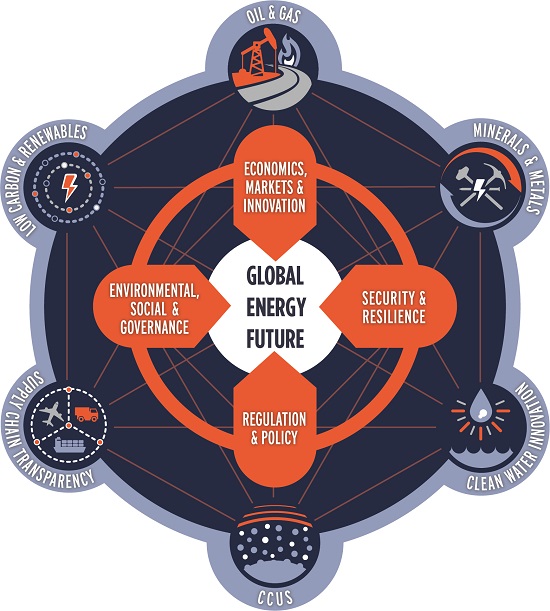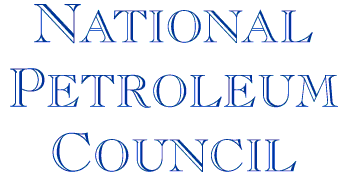Global Energy Future Initiative
Connecting energy innovators,
industry leaders and policy makers
to advance scientific, data-driven solutions
for the global energy future
The Future of Energy is Now, at Mines
Join the Mines Global Energy Future Initiative as we bring together global energy thought leaders and world-class Colorado School of Mines faculty through research, education, workshops, seminars and outreach.

Why Mines Global Energy Future Initiative?
Governments and industry around the globe are pursuing increasingly ambitious initiatives to reduce greenhouse gas emissions and diversify their energy portfolios, all while the world is facing significant growth in energy demand from emerging and developing economies. On these complex issues, Mines has a unique combination of expertise with the depth to meet the energy challenges head on. Mines has an exceptional track record of solving tough scientific and engineering problems across the gamut of energy and environmental fields. The university enjoys a hard-earned reputation as an unbiased problem-solver in disciplines often at odds in the energy-environment discussion; the university tagline, “Earth, Energy, Environment” is an accurate reflection of our expansive and growing purview.
With partners from academia, industry, government, and civil society galvanized by Mines’ uniquely comprehensive expertise, we’re developing energy solutions that will shape decision-making, now and in the decades to come.
Impactful Hubs

Low Carbon and Renewable Energy
Developing renewable, secure, resilient, and adaptive energy infrastructure that fosters economic growth while reducing environmental impact
Carbon Capture Utilization & Storage (CCUS)
Multidisciplinary approach to scientific, engineering and policy research on net zero emissions technological innovations
Clean Water Innovations
Role of technology innovation in reimagining global water in the future energy system
Minerals & Metals
Finding solutions to meet the minerals and metals needs to create our future energy system, including sustainable mining practices; technological innovations in mining; and the role of markets, economics and policy
Oil and Gas
Designing interdisciplinary research focused on the science, engineering and policy of oil and gas in the net-zero energy future
Supply Chain Transparency
Understanding how the future energy system will impact the global supply chain and the associated effects on markets, communities and the environment
Latest News
Colorado School of Mines awarded $10.5M in fuel cell funding 4/26/2024
Colorado School of Mines awarded $10.5M in fuel cell funding
Payne Institute Faculty Fellow Robert Braun is featured in this article about how his research team received three federal awards boost funding for fuel cell and hydrogen technologies research. The team is approaching this challenge from a multidisciplinary lens, with researchers bringing experience across cutting-edge fuel-cell research capabilities including new materials development, high-temperature electrochemistry, device design and characterization, ammonia chemistry, and systems integration. April 24, 2024.
Greenhouse Gases Life Cycle Assessment for Natural Gas and Liquefied Natural Gas 4/23/2024
Greenhouse Gases Life Cycle Assessment for Natural Gas and Liquefied Natural Gas
Payne Institute Director Morgan Bazilian contributed to this report from the National Petroleum Institute on titled Reducing GHG Emissions from the U.S. Natural Gas Supply Chain. His contributions were made to Chapter 4 – Greenhouse Gases Life Cycle Assessment for Natural Gas and Liquefied Natural Gas. The chapter introduces the fundamental concepts of LCA, discusses modeling GHG emissions from U.S. natural gas and LNG supply chains, quantifies life cycle GHG emissions, and explores application of LCAs in public and corporate policies. April 23, 2024.
Drinking water for 268,000 Coloradans exceeds new limits on “forever chemicals” 4/21/2024
Drinking water for 268,000 Coloradans exceeds new limits on “forever chemicals”
Payne Institute Faculty Fellow Chris Higgins contributes to this article about how the utilities that provide drinking water to nearly 268,000 Coloradans will need tens of millions of dollars over the next five years to comply with new federal limits on harmful “forever chemicals,” but finding the money will be a challenge — especially for small, rural systems. April 21, 2024.
Jennifer Miskimins nominated as 2026 president of Society of Petroleum Engineers 4/17/2024
Jennifer Miskimins nominated as 2026 president of Society of Petroleum Engineers
Payne Institute Faculty Fellow Jennifer Miskimins, professor and head of the Petroleum Engineering Department at Colorado School of Mines, has been nominated to serve as the 2026 president of the Society of Petroleum Engineers (SPE), the premier global organization for oil and gas professionals. Dr. Miskimins is a Mines alum, Miskimins has 30 years of industry experience and has led Petroleum Engineering Department since 2020. April 17, 2024.
Hydrogen Tax Credit Rules Must Sync With Biden’s Climate Agenda 4/10/2024
Hydrogen Tax Credit Rules Must Sync With Biden’s Climate Agenda
Payne Institute Director Morgan Bazilian, Deputy Director Greg Clough, and Responsible Gas Program Advisor Simon Lomax write about how President Joe Biden’s climate change agenda is more aggressive than anything previously in US energy and environmental policy. But involving many federal departments and agencies in administering these initiatives introduces risks that must be managed, such as the danger of disorganization and conflicting policies from different parts of the US government that will make reducing carbon emissions slower and more expensive. April 10, 2024.
Why Mines?
Since 1874, Mines has been a pioneer at the frontiers of science and engineering, from locating and recovering earth resources, to energy production, to environmental stewardship.
Over time, Mines’ expertise expanded to meet the changing needs of industry and society, playing key roles in the growth of the global energy and natural resource industries. We are now positioned to leverage that deep expertise through a data-driven approach to informing the global energy future, in collaboration with academia, industry, government and civil society partners.
Leadership
John Bradford
Vice President for Global Initiatives
Morgan Bazilian
Director, Payne Institute for Public Policy
For more information about the Mines Global Energy Future Initiative at the Colorado School of Mines, please contact our Deputy Director, Gregory Clough, at gclough@mines.edu.
Mines@150
As Colorado School of Mines approaches our sesquicentennial, we are ideally suited to lead this initiative. Our bold and ambitious MINES@150 strategic plan builds on the exceptional legacy of our PAST, the ways we impact the PRESENT and the POSSIBILITIES of our global energy future.











